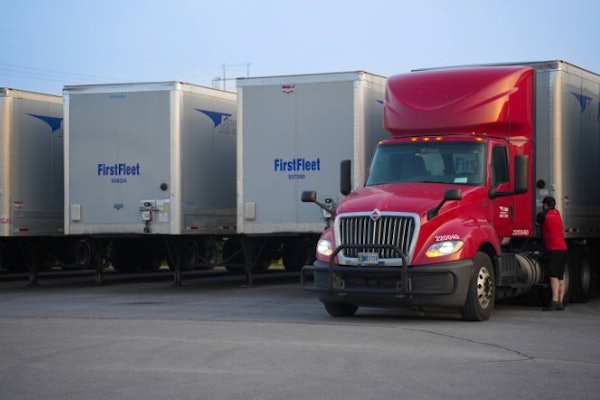A new law in Arkansas offers up to $3,500 in tuition and expenses to residents who train for the trucking industry and stay in the state and the industry a year. The two-year program, pushed by the Arkansas Trucking Association, provides $9 million to 11 state college campuses through the state Department of Workforce Services to help students.
Pennsylvania Gov. Ed Rendell selected Morgan Stanley & Co. as the state’s principal adviser in assembling a financial transaction that could leverage the state’s investment in the Pennsylvania Turnpike to pay for highway improvements statewide. Morgan Stanley will explore alternatives, including a lease or concession of the turnpike and new revenue options, such as tolls on other state highways or a $1 “congestion fee” in certain urban areas.
U.S. Transportation Security Administration said the standard fee for a Transportation Worker Identification Credential applicant is $137.25, or $105.25 for applicants who already completed a comparable threat assessment. The initial phase of the TWIC program will apply to workers at ports, including truck drivers. The cards will be rolled out over 18 months to 750,000 workers.
DaimlerChrysler Truck Financial (website) said it will regionalize its sales, fleet credit, dealer credit and new small business credit departments to allow for more sharing and understanding of regional market conditions and stronger relationships with dealers.
The Internal Revenue Service in March confirmed that auxiliary power unit packages installed on tractors within six months of the tractors being placed into service typically would be subject to the 12 percent federal excise tax on heavy vehicles. The decision, outlined in a private letter ruling (PLR) to an undisclosed fleet owner, is not especially surprising as tax rules already include other parts and accessories costing at least $1,000 and installed within six months of a new heavy truck, tractor or trailer being placed into service.
Technically, a PLR applies only to the taxpayer who requested the ruling and is limited to the facts presented. The Internal Revenue Code specifically states that such taxpayer-specific documents are not to be cited as precedent. But it stands to reason that in a similar factual situation, the IRS would reach the same conclusion regarding other taxpayers.
In this case, the fleet last year began installing APUs on its tractors, but in almost all cases it installed the APUs more than six months after the tractors were placed in service. The fleet owner did not have to pay the excise tax in those situations, but it sought a ruling on the applicability of the tax to APUs installed on tractors acquired more recently.
The APU package involved in this ruling includes a 2-cylinder diesel engine and an air-conditioning compressor mounted on the side of the tractor’s frame rails; a fuel-fired bunk heater, evaporator and controller installed in the cab, the sleeper compartment or tractor toolbox; and a condenser usually mounted on the back of a tractor cab.
A copy of the PLR is available at this site.
Reminder: Imported trucks are taxable
The Internal Revenue Service is reminding truck buyers that they can’t escape the 12 percent federal excise tax on the first retail sale of certain trucks, tractors and trailers just by buying them in another country. Truck owners who don’t pay the tax promptly after importing taxable vehicles are liable for interest and, potentially, penalties once the IRS catches up with them.
In the United States, the 12 percent federal excise tax typically is paid at the dealer level, but dealers in other countries aren’t liable for the tax, of course. There is still a tax liability if the vehicle is imported, however. When a truck owner brings a heavy vehicle into the United States that would be taxed if bought here, the tax kicks in once the owner uses the vehicle. The truck buyer would report the tax on Form 720, which would be due at the end of the quarter in which the sale or first use took place.
The issue appears to arise most with small and medium-sized trucking companies buying vehicles in Canada, says Joe Mazzuca, an IRS excise tax policy analyst. Mazzuca suspects
that some Canadian truck dealers are promoting the lack of an excise tax as a way to entice U.S. fleet owners to buy across the border.
U.S. Customs and Border Protection shares import data with the IRS regarding articles subject to the 12 percent excise tax. So if truck owners don’t pay the tax on their own initiative, it’s likely that the IRS ultimately will catch up with them. By then, interest might make the tax far larger, and the owner might be subject to additional penalties.
For more information on the applicability of the excise tax to imported vehicles, go to this site.
Repos reported higher in 2006
Repossessions and liquidations of tractor-trailer trucks rose nearly 8 percent in 2006 compared with 2005, according to Nassau Asset Management’s NasTrac Quarterly Index.
The company tracks equipment trends as part of its business providing collections, repossessions and remarketing services to the nation’s leasing and finance industry.
An increase in repossessions is not always negative, says President Edward Castagna, president of Westbury, N.Y.-based Nassau. The NQI may simply reflect an overall increase in financed equipment saturating the marketplace or consolidation, as well as mergers and acquisitions, Castagna says.
But the rise in tractor-trailer repossessions in 2006 seems to signal that another challenging year is ahead for small- to mid-sized trucking businesses – one that could result in even greater numbers of repossessions, Castagna says.
“Truck repossessions and liquidations have been on an upward trend for seven of the past eight quarters, and current conditions indicate this trend will continue,” Castagna says, citing fuel price volatility and a continued downturn in the housing market.








